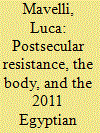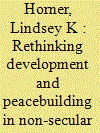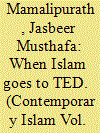| Srl | Item |
| 1 |
ID:
117462


|
|
|
|
|
| Publication |
2012.
|
| Summary/Abstract |
At the heart of the notion of the postsecular is an implied and largely under-theorised idea of resistance against the pathologies of modern secular formations. This is most notably exemplified by Jürgen Habermas's highly influential approach which argues that these pathologies can be resisted through a cooperative cognitive effort of secular and religious consciousnesses. This article contends that this understanding overlooks more embodied forms of resistance to the effect that it curtails our capacity to conceptualise postsecular resistance in international relations. Following a contextualisation of Habermas's approach in the broader Kantian tradition to which it belongs, the article develops a contending Foucauldian reading of the body as a locus of resistance and uses this framework to analyse some of the events leading to the 2011 Egyptian revolution. The focus is on the publication of images and videos of police abuses by Egyptian bloggers and independent media as a practice of resistance to the widespread and systematic use of torture. The emotional response to these images, it will be argued, contributed to unite Egyptians despite longstanding fractures, most notably that between secularists and Islamists, thus turning the body from an 'inscribed surface of events' into a postsecular locus of resistance. The article concludes by highlighting the main implications of this analysis for future research agendas on the postsecular in international relations.
|
|
|
|
|
|
|
|
|
|
|
|
|
|
|
|
| 2 |
ID:
154474


|
|
|
|
|
| Summary/Abstract |
This paper aims to positively engage with the religious character of many development contexts through an exploration of my own fieldwork in Mindanao. Through problematising a secular development industry and building on the momentum of the religious turn some scholars have identified, I share my initial explorations of how a postsecular framing might offer an alternative approach to development and peacebuilding. Through a deconstructive framing of the religious-secular binary I analyse the practices of one small non-governmental organisation (NGO) and suggest that a practice of ‘journeying with’ – Muslims and Christians on the shared philosophical/theological project to nourish each other’s faiths – can contribute to material and spiritual benefit, and the conditions to enable this.
|
|
|
|
|
|
|
|
|
|
|
|
|
|
|
|
| 3 |
ID:
188960


|
|
|
|
|
| Summary/Abstract |
New media studies on Islam are focused on investigating the characteristics of Islamic discourse or Muslim practices in digital landscape. Since there is increasing visibility of knowledge production on Islam by non-Islamic, secular middlebrow spaces such as TED, it is significant to examine their way of communicating Islamic ideas to a global audience. By conducting a discourse analysis of TED Talks on Islam, this study explores the dominant discursive strategies of TED Talks on Islam. By doing so, this study introduces how a more empirically and context-oriented understanding of the concept of the postsecular would benefit considerably from examining the discursive features of the contemporary nexus of Islam, new media, popular culture, and storytelling. Three main discourse features are found: (1) emphasis on a Judeo-Christian framework, (2) use of awe-inducing, personalized storytelling, and (3) secular translation of Islamic themes. While this emerging online-mediated discourse on Islam informs about new storytelling strategies, the language used adopts a highly attenuated perception of Islamic themes, and a great deal of traditional Islamic interpretation is replaced with excessively individualistic assumptions that are often tailored to cater to Western secular liberal mindsets.
|
|
|
|
|
|
|
|
|
|
|
|
|
|
|
|